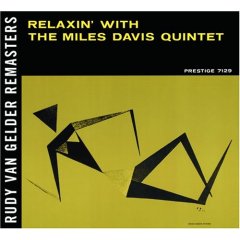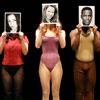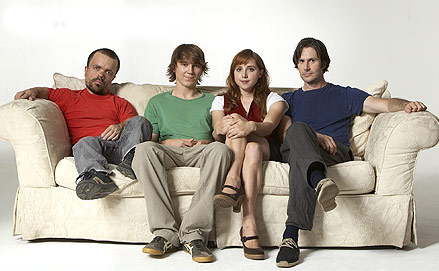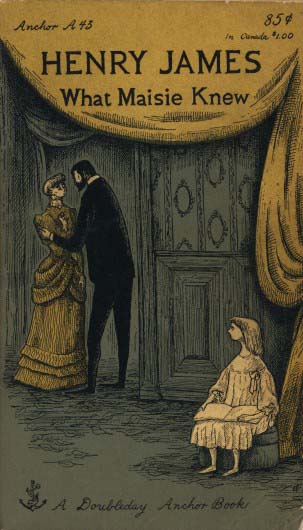Philo T. Farnsworth–about whom much more above–appeared in 1956 as a guest on the prime-time TV game show I’ve Got a Secret. Like everything else, that appearance can be found on YouTube. Take a peek if you want to know what got left out of The Farnsworth Invention, then go here to learn still more.
Archives for 2007
TT: Almanac
“A family’s photograph album is generally about the extended family–and, often, is all that remains of it.”
Susan Sontag, On Photography
TT: Instant joy
 I’ve been writing like a lunatic all day–well, all week–and decided ten minutes ago that I needed some serious attitude adjustment right now, so I punched up iTunes and went looking for solace.
I’ve been writing like a lunatic all day–well, all week–and decided ten minutes ago that I needed some serious attitude adjustment right now, so I punched up iTunes and went looking for solace.
What did I choose? Miles Davis’ 1956 recording of If I Were a Bell, a song from Guys and Dolls that he turns into the hippest, hardest-swinging tune imaginable, aided and abetted by John Coltrane, Red Garland, Paul Chambers, and Philly Joe Jones. Three snaps of Miles’ fingers and the rhythm section eases in with a cool two-beat riff, followed by a tightly muted trumpet playing the theme. Then the Prince of Darkness takes a two-bar break, the rhythm section shifts gears, and all at once everybody’s off and running…and I’m smiling. And patting my foot. And wishing (for there is no light without shadow) that I were still a jazz musician so that I could spend my life playing such music. And feeling good again. And looking at the clock to see how long it will be before Mrs. T arrives on my doorstep after a week in Connecticut. And smiling some more.
Life is good. Likewise music. Listen to some.
TT: So you want to see a show?
Here’s my list of recommended Broadway, off-Broadway, and out-of-town shows, updated weekly. In all cases, I gave these shows favorable reviews in The Wall Street Journal when they opened. For more information, click on the title.
Warning: Broadway shows marked with an asterisk were sold out, or nearly so, last week.
BROADWAY:
• Avenue Q (musical, R, adult subject matter and one show-stopping scene of puppet-on-puppet sex, reviewed here)
 • A Chorus Line (musical, PG-13/R, adult subject matter, reviewed here)
• A Chorus Line (musical, PG-13/R, adult subject matter, reviewed here)
• The Drowsy Chaperone (musical, G/PG-13, mild sexual content and a profusion of double entendres, reviewed here)
• Grease * (musical, PG-13, some sexual content, reviewed here)
• Rock ‘n’ Roll * (drama, PG-13, way too complicated for kids, reviewed here)
• The 25th Annual Putnam County Spelling Bee * (musical, PG-13, mostly family-friendly but contains a smattering of strong language and a production number about an unwanted erection, closes Jan. 20, reviewed here)
OFF BROADWAY:
• The Fantasticks (musical, G, suitable for children old enough to enjoy a love story, reviewed here)
• The Glorious Ones (musical, R, extremely bawdy, closes Jan. 6, reviewed here)
 • Things We Want (drama, R, adult subject matter, closes Dec. 30, reviewed here)
• Things We Want (drama, R, adult subject matter, closes Dec. 30, reviewed here)
CHICAGO:
• A Park in Our House (drama, PG-13, adult subject matter, closes Sunday, reviewed here)
• What the Butler Saw (comedy, R, extremely adult subject matter, closes Sunday, reviewed here)
EAST HADDAM, CONN.:
• 1776 (musical, G, too complicated for small children, closes Sunday, reviewed here)
MILLBURN, N.J.:
• Meet Me in St. Louis (musical, G, completely family-friendly, closes Dec. 16, reviewed here)
CLOSING SOON IN NEW YORK:
• Pygmalion * (comedy, G, suitable for mature and intelligent young people, closes Dec. 16, reviewed here)
TT: Almanac
 “You have to be careful with the intellect as an artist. The intellectual struggles with the facts. That’s not inspirational. If you are an intellectual and you are going to buy a house, you would think about the cost, check on the taxes, look at the survey, and go through a whole list of things that make you feel better about buying the house. If you couldn’t rationalize it, you wouldn’t buy it. If the house genuinely inspired you, you wouldn’t worry about the list. You would find a way to buy it. You have to deal with the practical matters, but you wouldn’t worry about them because you would be involved with your inspiration. That’s what artists have to do. They have to stay involved with their inspiration. They can’t be constantly worried about the cost of paint.”
“You have to be careful with the intellect as an artist. The intellectual struggles with the facts. That’s not inspirational. If you are an intellectual and you are going to buy a house, you would think about the cost, check on the taxes, look at the survey, and go through a whole list of things that make you feel better about buying the house. If you couldn’t rationalize it, you wouldn’t buy it. If the house genuinely inspired you, you wouldn’t worry about the list. You would find a way to buy it. You have to deal with the practical matters, but you wouldn’t worry about them because you would be involved with your inspiration. That’s what artists have to do. They have to stay involved with their inspiration. They can’t be constantly worried about the cost of paint.”
Agnes Martin (interviewed in Michael Auping, 30 Years: Interviews and Outtakes)
OGIC: Thank heaven for little girls
I had to laugh reading Carrie’s post last week about a young, precocious reviewer taking Louisa May Alcott to task for, among other sins, this cardinal one:
We are utterly weary of stories about precocious little girls. In the first place, they are in themselves disagreeable and unprofitable objects of study; and in the second, they are always the precursors of a not less unprofitable middle-aged lover.
 The spectre of some of James’s future novels, notably What Maisie Knew, looms a bit smirkingly over this sweeping pronouncement. And the spectre of his yet later preface to the New York edition of Maisie? Pretty much rolling around on the floor in hysterics. It’s in the preface that James finds ample good reason to center a story on a little girl, especially of the precocious variety:
The spectre of some of James’s future novels, notably What Maisie Knew, looms a bit smirkingly over this sweeping pronouncement. And the spectre of his yet later preface to the New York edition of Maisie? Pretty much rolling around on the floor in hysterics. It’s in the preface that James finds ample good reason to center a story on a little girl, especially of the precocious variety:
My light vessel of consciousness…couldn’t be with verisimilitude a rude little boy; since, beyond the fact that little boys are never so ‘present,’ the sensibility of the female young is indubitably, for early youth, the greater, and my plan would call, on the part of my protagonist, for ‘no end’ of sensibility…
[Maisie] has the wonderful importance of shedding a light far beyond any reach of her comprehension; of lending to poorer persons and things, by the mere fact of their being involved with her and by the special scale she creates for them, a precious element of dignity. I lose myself, truly, in appreciation of my theme on noting what she does by her ‘freshness’ for appearances in themselves vulgar and empty enough. They become, as she deals with them, the stuff of poetry and tragedy and art; she has simply to wonder, as I say, about them, and they begin to have meanings, aspects, solidities, connexions–connexions with the ‘universal!’–that they could scarce have hoped for.
I know, I know–not only does this come decades later, but it comes in the thick of James’s experiments with point of view, and his enthusiasm is accordingly at least as much for the technical challenge he faced in the novel (and met, if he does say so himself) as for the endlessly rich potential of little girls as subjects for novels. But it’s still fun–and fitting–to provide Alcott with a little vindication.
I wrote about Maisie a while back here, noting that the character is a favored Jamesian type: “Small children, working-class men and women, the ill, the dispossessed: when such characters crop up in James, they tend to share this combination of heightened receptivity–a marked capacity for taking things in, for knowing–and an instinctual or strategic disinclination to be known. A form of self-protection, the latter.”
OGIC: Fortune cookie
“No themes are so human as those that reflect for us, out of the confusion of life, the close connection of bliss and bale, of the things that help with the things that hurt, so dangling before us for ever that bright hard metal, of so strange an alloy, one face of which is somebody’s right and ease and the other somebody’s pain and wrong.”
Henry James, Preface to What Maisie Knew
TT: Almanac
“Art is a conservative power, the strongest of all; it preserves spiritual possibilities that without it–perhaps–would die out.”
Thomas Mann, Reflections of an Unpolitical Man
